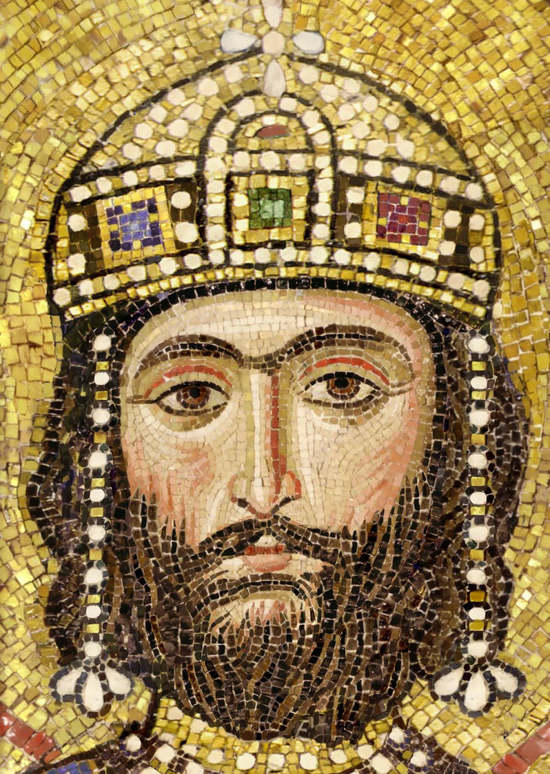Athanatoi - Does the mighty cavalry name 'immortal' be worthy of that name?
Are we overly "gods" named Athanatoi - the mighty cavalry team.
Those who have played "Age of Empire" (which is the title of the Empire) must surely have been struggling to support the "horse" team (cavalry) of the mighty Byzantine (East Roman) empire.
And those who know Lara Croft: Tomb Raiders game certainly cannot forget Athanatoi - the army of those who cannot die. "Athanatoi", also known as "The Immortals", has become an unfamiliar phrase for those who like to learn ancient European military, and those who like the mysterious historical element.

Athanatoi - a name familiar to many gamers.
Owning such a terrible name, everyone must understand that this army is "invincible". But the truth, why? They are still defeated, and is that name just a nominal name? We will go find out.
The origin of the "immortal" name
The name Athanatoi comes from an ancient Greek word Άθάνατοι, with "a" meaning "no" and "Thanatos" as the mythical god of death. The army was part of the regiment τάγματα (meaning guard), of the Byzantine army from the 7th century, originating from the young Roman nobility of the East.
There was also a document indicating that Athanatoi was part of the neighboring countries' military, but modern historians countered, arguing that the army was born in Byzantines and included indigenous people.
Regarding the meaning of the name, it is first necessary to know that Athanatoi is a heavy cavalry, wearing full body armor, covering from head to toe, even their horses are protected "to the teeth".
In historical documents, Anna Komnene - Byzantine Emperor Alexios I's daughter called this armor "kataphraktoi", meaning "protected by the whole body".

Kataphraktoi's body consists of the "armor" section - lōrikion alysidōton, the "scales" part - lōrikion folidōton, and the metal piece covering the chest is klivanion. According to modern historians, this armor can "resist" the attack of sharp iron weapons.
Legend has it that the king Alexios I was besieged in the siege of the Normans. They used the attack power to attack him, but did not even create a scratch thanks to this special armor.
Then the king was rescued and even overturned the battle to win the war. Perhaps it is because of this that Athanatoi has the "immortal" title.
Are they really immortal like their names?
Perhaps everyone had rumored too much about Athanatoi's reputation, because the monumental armor was the result of the development of a Byzantine military base, and all the history recorded about Athanato is only . A faint name.
The most obvious proof is probably the failure of the rare battles recorded with the participation of Athanatoi. That was when Alexios I Komnenos resisted rebellion Nikephoros Bryennios Elder in the 1070s.
 Alexios I Komnenos.
Alexios I Komnenos.
In the document published by Anna Komnene, the army was in a very bad situation: ". the Roman dynasty was then exhausted. The army was scattered sparsely across the Eastern Front. , while Turkish allies are busy making troops to invade nearby continents. "
The army of Alexios I consists of "Athanatoi", 300 Chomatenes, several mercenaries of Frank and allies from Turkey against at least 10,000 people of the Bryennios.
The posture was clearly detrimental to the Byzantine faction, but no one knew why the king still decided to fight even though the Turkish ally had not yet appeared.
After encountering the elite of Bryennios, ambushes were quickly wiped out. The army of immortal invincibility infused Athanatoi also quickly disintegrated. Alexios had to withdraw and retreat.
Fortunately, Alexios' Turkish ally appeared in time and countered. Bryennios couldn't control his army anymore and was arrested. The battle ended with the victory in favor of Alexios.
Several other writings have also written that Athanatoi appeared in the battle against the Pechenegs in the 1090s, but nothing stands out and then disappears.
Of course, even though Alexios I had won, it was not because of the effort of the "immortal" army that everyone thought was good. It was just an ordinary army, bearing the title of "overwhelming" in a dynasty that left many notoriety in Byzantine history.
- The immortal 'demons' in history
- 13 most powerful military forces in the history of the ancient world
- Super warrior armor iron - horrors of ancient Rome
- Scientists predict when humans will become immortal
- 50 million tons of human immortal cells are taken from a woman
- Billionaires are offered an immortal life
- Immortal animals appear
- Discovered the 2,000-year-old hat of the Roman cavalry
- Miraculous nature: These are creatures that make you believe in immortality!
- Find the island with the pyramid of the mighty Tarascan tribe in Mexico
- Experiment with immortal drugs
- Learn 4 Iraq's mighty empire
 'Fine laughs' - Scary and painful torture in ancient times
'Fine laughs' - Scary and painful torture in ancient times The sequence of numbers 142857 of the Egyptian pyramids is known as the strangest number in the world - Why?
The sequence of numbers 142857 of the Egyptian pyramids is known as the strangest number in the world - Why? History of the iron
History of the iron What is alum?
What is alum?